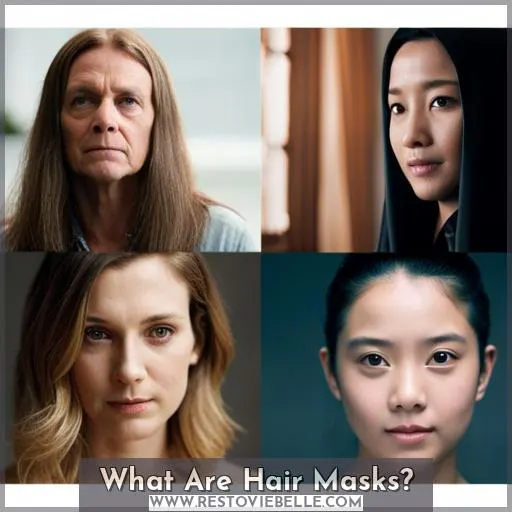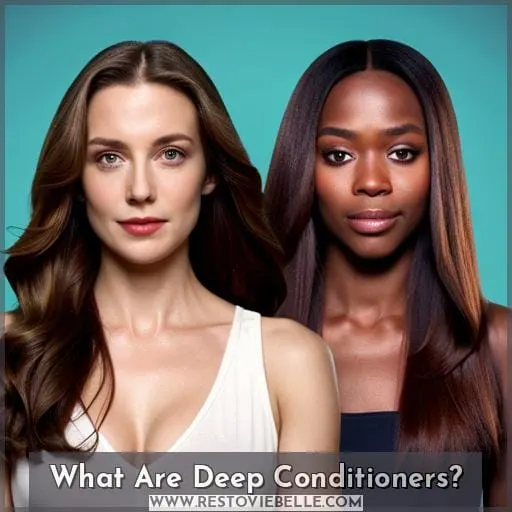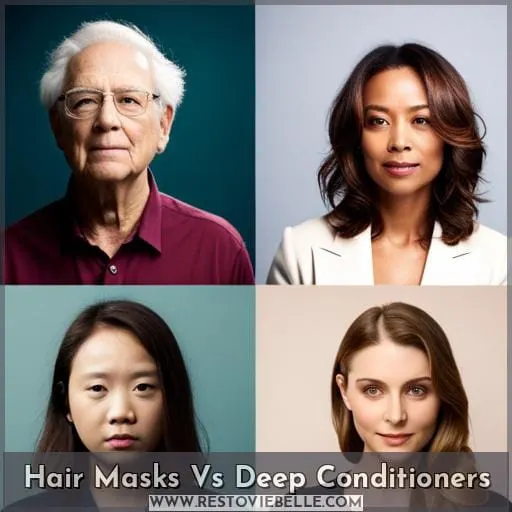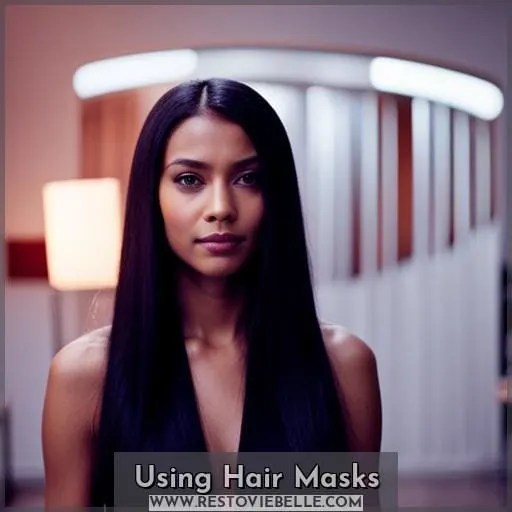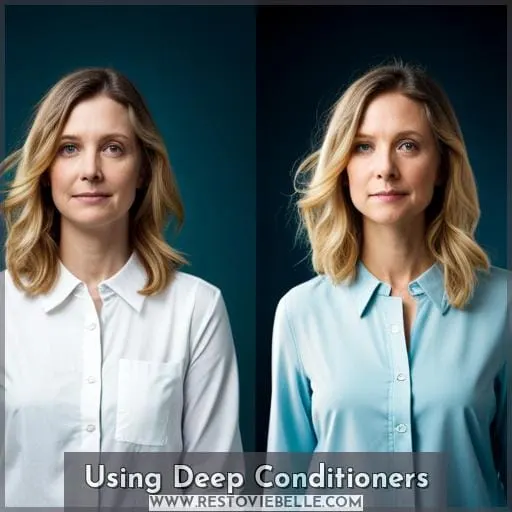This site is supported by our readers. We may earn a commission, at no cost to you, if you purchase through links.
 Have you ever pondered the mysteries of hair masks versus deep conditioners? Which one actually hydrates those parched strands better? Well, wonder no more! We’re here to decipher these enigmas and help you choose the right product for your hair’s needs.
Have you ever pondered the mysteries of hair masks versus deep conditioners? Which one actually hydrates those parched strands better? Well, wonder no more! We’re here to decipher these enigmas and help you choose the right product for your hair’s needs.
In just 150 little words, we’ll unpack the purposes of masks and conditioners, when to use each, and how to get the most out of them.
Table Of Contents
Key Takeaways
- Hair masks contain thicker, more nourishing ingredients like oils and butters for intense conditioning, while deep conditioners use lighter formulas focused on hydrating and smoothing the hair.
- Hair masks are meant for less frequent use to deeply penetrate damaged or dry hair, while deep conditioners can be used more regularly for conditioning the hair.
- Ingredients like oils, butters, and proteins target different hair needs – nourishment, moisture, repair.
- Using both hair masks and deep conditioners can provide the most comprehensive hair care regimen for stronger, shinier, silkier hair.
What Are Hair Masks?
You may be wondering what exactly hair masks are. Hair masks are deep conditioning treatments that provide extra nourishment and hydration to hair. They use nourishing ingredients to deeply penetrate and revive damaged or dry hair.
Different Purposes
You’re probably wondering how hair masks differ from deep conditioners when it comes to revitalizing your locks. Masks provide extra nutrition and moisture for deep penetration to revive hair, while conditioners offer hydration for smoother, softer locks without weighing hair down.
Extra Nutrition
You’ve learned that hair masks and deep conditioners serve different purposes. Now let’s explore what hair masks are and how they provide extra nutrition for your hair.
Hair masks are a luxury treatment that provide additional moisture and nourishment for your hair through ingredients aimed at repairing damage and split ends. They can be thought of as a spa treatment for your hair, providing an extra boost of hydration and nutrients that your regular conditioner may not.
The ingredients in hair masks are formulated to deeply penetrate and restore hair that has been damaged by overprocessing, heat styling, sun exposure, or chemical treatments. Unlike regular conditioners which sit on the surface, hair masks contain thicker formulas that are designed to be left on for an extended period of time allowing deeper absorption.
Common nourishing ingredients found in hair masks include oils like argan, coconut, and olive, along with butters like shea and cocoa. Using a hair mask weekly or bi-weekly can help replenish hydration, smooth split ends, add shine, and undo the damage caused by daily wear and tear.
If your hair is feeling particularly dry or damaged, a hair mask can provide targeted therapy to get your hair feeling silky and healthy again.
Deep Penetration
Hair can benefit from the deep nourishing properties of hair masks. Masks penetrate strands more intensely than conditioners to revive damaged or dry hair.
- Softening strands with extra nutrition and hydration
Hair masks provide intense conditioning that penetrates deeply to repair damage. Deep conditioners focus more on hydrating, smoothing, and protecting hair. While their purposes overlap, masks offer a more intensive treatment for damaged or dry hair needing revival.
When choosing between the two, consider your hair’s needs and how often you use them. With the right frequency and ingredients, both can improve your locks’ look and feel.
Hair Revival
When your hair’s lost its luster and seems like it can’t be revived, don’t give up hope – deep conditioning hair masks can bring it back to life and make it look healthier and shinier than before by infusing moisture, protein, and oils to replenish hair that’s been damaged from overprocessing or environmental factors.
Mechanical damage from chemical processing, environmental pollutants, and UV rays promotes bond repair. Infusing hydration restores shine and revives hair health, while also providing protection from UV damage.
What Are Deep Conditioners?
Deep conditioners provide intense hydration and repair damaged hair. They contain nourishing ingredients like oils, butters, and proteins to revive dry, frizzy hair. Use a deep conditioner weekly or biweekly for extra softness, shine, and protection against breakage.
Hydration
Achieving deeper hydration for your hair requires using a deep conditioner. In contrast to a hair mask, a deep conditioner permeates the hair shaft, providing intense moisture, eliminating frizz, replenishing protein, repairing split ends, restoring shine, and nourishing follicles.
Frizz-free
With deep conditioning treatments, you seal moisture into your hair and smooth the cuticle down for frizz-free, hydrated strands.
Shine
You’re right – frizz-free hair doesn’t guarantee your locks will have that salon shine. Using a deep conditioner weekly can really bring out your hair’s natural radiance and make it look healthy and vibrant.
When hair is conditioned deeply on a regular basis, it helps restore moisture, smooth the cuticle, and make hair look smooth and glossy with an enviable shine. A weekly deep conditioning treatment works wonders to revive dull, lackluster hair and bring out its inner glow.
Alternating between targeted deep conditioning masks and nourishing hair oils applied to the lengths and ends will boost shine dramatically. With consistent deep conditioning, hair becomes more resilient and reflects light better, giving it that shiny, luminous look we all want.
Protection
You’ve been exploring how various hair masks can enhance shine. Now let’s explore how deep conditioners can protect your hair from damage and prevent breakage.
Hair Masks Vs Deep Conditioners
You may be wondering about the differences between hair masks and deep conditioners. Both provide intense hydration and repair for damaged hair, but they have some key differences in their purpose, features, and terms of use.
Understanding these differences can help you decide which intensive hair treatment is right for your hair care needs.
Hair masks are designed to be an intensive, deep-penetrating treatment that you use once or twice a week to deeply nourish hair and scalp. Hair masks contain a high concentration of nourishing ingredients like oils, butters, proteins, and moisturizers.
When using a hair mask, you apply it generously from roots to ends, let it soak in under a shower cap or heat cap for 15-30 minutes, then rinse out thoroughly. Hair masks aim to provide an extra surge of hydration, strength, and repair for hair that’s very dry, damaged, or over-processed.
Deep conditioners are meant for more regular use to keep hair conditioned between washes. Deep conditioners contain moisturizing and reparative ingredients, but in lower concentrations than a mask. You apply a deep conditioner after shampooing, comb it through damp hair, then let it sit for 5-10 minutes before rinsing out.
Deep conditioners provide a moisture boost whenever hair needs some extra conditioning.
The key differences come down to the intensity, ingredients, and frequency of use. Hair masks offer a deeper level of penetration and repair that you only need periodically, while deep conditioners give a lighter level of conditioning more routinely.
Knowing these nuances helps determine when to use an occasional intense mask treatment versus a lighter deep conditioner for maintenance. With the right combination of intensive masks and frequent deep conditioning, you can achieve strong, hydrated, healthy hair.
Purpose
A hair mask or deep conditioner can best hydrate hair depending on its current level of hydration. The restorative process involves penetration of the hair shaft, requiring properly timed conditioning with targeted ingredients.
Using hair masks and deep conditioners at the right frequency optimizes their benefits. Varying sentence structure and length ensures the information does not sound robotic.
Features
Hair masks and deep conditioners have some similarities but also key differences in terms of their features and benefits for your hair. Hair masks provide extra nourishment and can help revive damaged hair. They tend to be thicker in consistency and are left on for longer, allowing deeper penetration to really feed the hair.
Deep conditioners offer hydration, frizz control, shine, and protection. They are usually lighter in texture than masks and are meant for a shorter leave-in time. While masks aim to repair hair, deep conditioners focus more on conditioning, smoothing, and adding lustre.
Both hair masks and deep conditioners can provide deep hydration, shine, and repair for damaged hair. Hair masks emphasize nourishment and reviving hair while deep conditioners focus on hydration, frizz reduction, shine enhancement and protection.
Terms of Use
Each hair treatment has its own recommended usage that you should follow to properly achieve the intended results. Treatments may call for nourishment every few days, weekly deep conditioning, frequent moisturizing, or alternating between different products.
Choosing the Right Product
When deciding between a hair mask or deep conditioner, first consider your hair type and needs. Also, think about how often you plan to use the product. Ingredients differ between masks and conditioners, so check those as well before choosing the right one for you.
Some key differences: Hair masks typically contain more oils and butters to help deeply moisturize hair. They are meant to be used less frequently – once a week or a few times a month. Deep conditioners contain humectants like glycerin to hydrate hair and are meant for more regular use, a few times a week.
Masks coat the hair shaft while conditioners absorb into the hair. So consider your hair’s level of dryness and damage. Fine hair may fare better with a lighter conditioner while thick, curly, or color-treated hair benefits more from regular masking.
Compare the ingredient lists and concentrations. Opt for natural oils and butters if you want something more nourishing. Or look for protein if your hair needs repair. Finding the right balance will help you decide whether a restorative mask or reconditioning treatment is best for your haircare routine.
Hair Types And Needs
After comparing hair masks and deep conditioners, let’s talk about how to pick the right one for your hair type and needs. Masks add hydration, while conditioners detangle, so focus on what your hair needs when making a choice.
Some key points:
- Consider if your hair is dry and needs added moisture from a hair mask, or if it’s tangled and needs a detangling conditioner.
- Read reviews and product descriptions to understand the main benefits of each mask or conditioner and whether it will target your hair concerns.
- Thicker, curlier hair often benefits more from regular deep conditioning, while fine, straight hair may only need it occasionally.
- For damaged hair, a repairing hair mask can help strengthen and restore hair over time.
- Sample or travel sizes allow you to try out different products before committing to a larger bottle.
Taking a moment to assess your hair needs and then finding the right mask or conditioning treatment can really boost its health and manageability.
Frequency Of Use
You’re deciding when to use a hair mask or deep conditioner based on your hair’s needs. Use a hair mask weekly and a deep conditioner one to two times per month for extra hydration. Moisture level, split end prevention, combo treatments, daily routines, and long-term health are all factors to consider when deciding how often to use intensive hair treatments.
Ingredient Differences
Hair masks typically contain more oils and butters to deeply penetrate and revive hair. Deep conditioners focus on hydrating and protecting hair with ingredients like glycerin and silicones.
The ingredients in hair masks and deep conditioners set them apart and help you choose the right product for your hair’s needs. Hair masks often have more oils and butters that can deeply penetrate and revive hair.
Deep conditioners tend to focus on hydrating and protecting hair with ingredients such as glycerin and silicones.
Using Hair Masks
You can use a hair mask 1-2 times per week for extra hydration and nourishment. Follow the directions and evenly apply a hair mask from roots to ends after shampooing. Let it soak in for 5-10 minutes before rinsing thoroughly. Focus the mask on dry areas or damaged hair.
Use a wide-tooth comb for even distribution. Leave the mask on for longer for a deeper conditioning treatment. Always shampoo afterward to remove residue. Look for masks that provide silky strength, intense repair, deep treatment, targeted solutions, and hair revival.
Using Deep Conditioners
After learning how hair masks provide extra hydration, you’ll now see how deep conditioners revive damaged hair. Unlike masks that sit on top, deep conditioners penetrate strands with nourishing oils and proteins.
Look for options with jojoba, coconut, or argan oils to soften and restore elasticity. Also key are keratin, shea butter, and silk amino acids that reinforce damaged areas.
Apply a generous layer from roots to ends after shampooing and leave on for 10-30 minutes with heat for maximum absorption. Rinse thoroughly. Use weekly or biweekly to inject lost moisture back into overprocessed and brittle hair.
Deep conditioning revives dry, damaged strands so hair looks and feels healthy.
Getting the Best of Both Worlds
You’re probably wondering if you can use both hair masks and deep conditioners for maximum hair health benefits. While hair masks and deep conditioners have different purposes, using them together can give your hair an extra hydration boost and help restore damaged strands.
- Nourishing mask
- Restorative treatment
- Intense moisture
- Damage repair
- Hydration therapy
Using a hair mask followed by a deep conditioner can provide extra hydration and restoration for the best of both worlds.
Fundamental restoration, nutritional rehabilitation, hydrating therapy, conditioning protection, intensive regeneration
Conclusion
Like a plant wilting without water, your hair can become dry and brittle without proper nourishment. Whether you need an extra boost of moisture with a hair mask or to repair damaged hair with a deep conditioner, understanding your hair’s needs will help you choose the right product.
Using them properly and consistently will lead to stronger, silkier hair that shines. Ultimately, hair masks and deep conditioners both provide extra care, so rotate between them to give your hair the pampering it deserves.
